





Biotechnology
UPDATE June 2023 - ICGB Newsletter No. 43
Internal Co-ordination Group for
BIOTECHNOLOGY
3
Internal Co-ordination Group for Biotechnology (ICGB) No. 43 – June 2023 Table of Contents ABOUT OECD’S INTERNAL CO-ORDINATION GROUP FOR BIOTECHNOLOGY (ICGB)......................4 GREEN GROWTH AND SUSTAINABLE DEVELOPMENT..............................................................................5 FOOD SYSTEMS 5 OECD AGRICULTURE MINISTERIAL MEETING 6 GLOBAL FORUM ON BIOTECHNOLOGY 7 HARMONISATION OF REGULATORY OVERSIGHT IN BIOTECHNOLOGY 8 SAFETY OF NOVEL FOODS AND FEEDS ........................................................................................................9 BIOTRACK ONLINE..............................................................................................................................................10 BIODIVERSIY ECONOMICS AND POLICY 11 REGULATION OF EXTERNALLY APPLIED DSRNA-BASED PRODUCTS FOR PEST MANAGEMENT12 CONFERENCE ON INNOVATING MICROBIAL PESTICIDE TESTING 13 OECD GLOBAL FORUM ON TECHNOLOGY – INAUGUAL EVENT WITH PLENARY PANEL ON SYNTHETIC BIOLOGY ........................................................................................................................................14 BIOTECHNOLOGY STATISTICS 15 BIOENERGY AND BIOFUELS AT TRADE AND AGRICULTURE DIRECTORATE 15 BIOENERGY AT THE INTERNATIONAL ENERGY AGENCY (IEA) 16 POLICIES FOR AGRICULTURAL INNOVATION 18 AGRICULTURAL SEED AND FOREST REPRODUCTIVE MATERIAL CERTIFICATION SCHEMES 20 CO-OPERATIVE RESEARCH PROGRAMME: SUSTAINABLE AGRICULTURAL AND FOOD SYSTEMS 21 COMING OECD EVENTS FROM JUNE 2023 25 OECD BIOTECHNOLOGY AND THE WORLD WIDE WEB 26 WHO’S WHO IN BIOTECH AT OECD?.............................................................................................................27 ENDNOTE: A BRIEF GUIDE TO THE OECD...................................................................................................29
Biotechnology Update
This newsletter provides up-to-date information on activities related to biotechnology or the life sciences more generally at the Organisation for Economic Co-operation and Development (OECD). It is mainly intended for OECD staff and delegates to OECD meetings who are already familiar with certain aspects of the Organisation’s work. We hope that it is also informative for the wider biotech community.
The contents of this ‘Biotechnology Update’ newsletter have been provided by those members of the OECD Secretariat who are responsible for the various activities. The Secretariat can be contacted via the e-mail address: ehscont@oecd.org. Alternatively, individuals can be contacted via e-mail using the form firstname.lastname@oecd.org (See Who’s Who list at the end of the newsletter).
Visit the OECD Biotechnology Update website to access the latest news and previous editions. You can also sign up to the OECD Biotechnology Update newsletter to receive future editions directly to your inbox.

ABOUT OECD’S INTERNAL CO-ORDINATION GROUP FOR BIOTECHNOLOGY (ICGB)
The Organisation for Economic Co-operation and Development (OECD) and its member countries have been addressing issues related to biotechnology since 1982.
From that time, biotechnology has had an increasing impact on the programmes of different sectors at OECD such as: agriculture and trade; environment; science, technology and innovation. In 1993, the Internal Coordination Group for Biotechnology (ICGB) was established to facilitate co-ordination among these sectors. Bertrand Dagallier, Head of OECD’s Biosafety and Novel Foods/Feeds Safety Programmes, is the Executive Secretary of the ICGB, and the editor of the ICGB Newsletter with the contribution of Akihiro Kagoshima
Contacts: Bertrand Dagallier, Akihiro Kagoshima (ENV/EHS)
4
GREEN GROWTH AND SUSTAINABLE DEVELOPMENT
The 2023 OECD Green Growth and Sustainable Development (GGSD) Forum on “Navigating the twin transitions: Going green and digital” will be held on 28-29 November 2023 at the OECD Conference Centre.
This year Forum will discuss the synergies and trade-offs between the digital and green transitions. Under this overarching theme, the Forum will address the joint impact of the twin transitions on competitiveness of sectors and regions, labour conditions, and how to ensure that no-one is left behind. The Forum will also shed light on how digital technologies can improve the design, monitoring and enforcement of environmental policies, and how SMEs can emerge more resilient, innovative and competitive from these societal transformations. Finally, the Forum will discuss the role of digital technologies in ensuring smart and sustainable cities, and the possible implications for international cooperation on green growth of the changes in the international landscape since the adoption of the UN 2030 SDG Agenda and the Paris agreement. The agenda and more information will be available on the Forum website in the next months.
Contacts: Kumi Kitamori, Enrico Botta (ENV)
Website: https://www.oecd.org/greengrowth/ggsd-forum.htm
FOOD SYSTEMS
Background
The term “food systems” refers to all the elements and activities that relate to the production, processing, distribution, preparation and consumption of food, and the effects of these activities. The emphasis on “food systems” highlights the importance of potential synergies and trade-offs across different policy domains which have often been treated in silos – e.g. public health and nutrition, the environment, poverty and rural development. Food systems matter not only for food security and nutrition, and for the livelihoods of those involved in them, but also for environmental sustainability. The United Nations organised a UN Food Systems Summit in September 2021, and OECD published a major report on Making Better Policies for Food Systems (2021).
Following the publication of Making Better Policies for Food Systems, OECD work on food systems tackled the question of evidence gaps on food systems. A first paper, Overcoming Evidence Gaps on Food Systems, set out the challenges. Four papers then explore evidence gaps on food insecurity and food assistance, gender and food systems, and environmental impacts along food supply chains and how to improve them.
Ongoing work on food systems
In 2023-24, OECD work on food systems will take stock of policies to reduce food loss and waste, and will assess practical approaches to strengthen resilience in food systems. Furthermore, OECD work will explore the possibilities and challenges involved in measuring and communicating environmental impacts of food.
As part of this work, in April 2023, the OECD Global Forum on Agriculture explored the topic of carbon footprints for food systems. A recording of the scene-setting presentation, outlining the various initiatives
5
to measure and communicate carbon footprints of food products; can be found here. A background paper, “Fast and Furious: The Rise of Environmental Impact Reporting in Food Systems”, is forthcoming in the European Review of Agricultural Economics
The OECD Food Chain Analysis Network will study this topic in detail. A first meeting is planned for June 2023 and will take stock of different initiatives to measure and communicate environmental impacts (including, but not limited to, carbon footprints). Experts will share experiences in designing environmental impact labels and other communication tools, and will discuss strengths and weaknesses of different measurement approaches (such as life-cycle assessments or farm-level calculation tools).
Recent publications:
Deconinck, K. and M. Hobeika (2022), "Improving environmental outcomes along food supply chains: A review of initiatives and their effectiveness", OECD Food, Agriculture and Fisheries Papers, No. 186, OECD Publishing, Paris, https://doi.org/10.1787/d549eb43-en
Deconinck, K. and L. Toyama (2022), "Environmental impacts along food supply chains: Methods, findings, and evidence Gaps", OECD Food, Agriculture and Fisheries Papers, No. 185, OECD Publishing, Paris, https://doi.org/10.1787/48232173-en
Giner, C., M. Hobeika and C. Fischetti (2022), "Gender and food systems: Overcoming evidence gaps", OECD Food, Agriculture and Fisheries Papers, No. 184, OECD Publishing, Paris, https://doi.org/10.1787/355ba4ee-en
Giner, C. and O. Placzek (2022), "Food insecurity and food assistance programmes across OECD countries: Overcoming evidence gaps", OECD Food, Agriculture and Fisheries Papers, No. 183, OECD Publishing, Paris, https://doi.org/10.1787/42b4a7fa-en
OECD (2021), Making Better Policies for Food Systems, OECD Publishing, Paris https://doi.org/10.1787/ddfba4deen
Deconinck, K., Giner, C., Jackson, L.A., and L. Toyama (2021), "Overcoming evidence gaps on food systems", OECD Food, Agriculture and Fisheries Papers, No. 163, OECD Publishing, Paris, https://doi.org/10.1787/44ba7574-en
Contact: Koen Deconinck (TAD/ATM)
OECD AGRICULTURE MINISTERIAL MEETING
On 3-4 November 2022, Ministers and Heads of delegations from 50 countries (represented by 30 Ministers and Vice Ministers of Agriculture) and 5 international organisations met in Paris for the OECD’s Meeting of Agriculture Ministers, the first such meeting since April 2016.
The Ministerial, under the theme “Building sustainable agriculture and food systems in a changing environment: Shared challenges, transformative solutions” was chaired by Minister Marie-Claude Bibeau of Canada and Minister Damien O’Connor of New Zealand, and drew over 280 participants who engaged over a day and a half in intensive discussions on the policies and research needed to build productive, sustainable and resilient agriculture and food systems. The inclusion of partner countries (Argentina, Brazil, Bulgaria, Cambodia, Croatia, Kazakhstan, Peru, Romania, Senegal, South Africa and Ukraine), along with the participation of the international organisations the Committee on World Food Security, FAO, World Bank, WTO and Business at OECD (BIAC) enriched the debate and brought useful perspectives to the meeting.
We were honoured to be joined by the Minister of Agrarian Policy and Food, Mykola Solskyi to hear his virtual intervention on the impact on food systems and agriculture of Russia’s invasion. We were also pleased that Israel announced that it will join the OECD’s Co-operative Research Programme: Sustainable Agricultural and Food Systems (CRP).
The 2022 Ministerial event concluded with the Declaration on Transformative Solutions for Sustainable Agriculture and Food Systems being adopted by the 38 OECD Member countries, the European Union,
6
as well as Bulgaria, Croatia, Peru and Romania. The Declaration articulates a shared vision for governments on the actions needed to transform agriculture and food systems with a view to i) ensuring food security and nutrition, ii) strengthening sustainability and iii) ensuring inclusive livelihoods. The Declaration underlines the key role of developing transformative and innovative policies towards more sustainable and resilient agriculture and food systems. To this end, it calls on countries to develop and implement coherent whole-of-government policy packages, promote inclusive processes, increase investment in research and development and infrastructure, enhance research collaboration and knowledge sharing, strengthen international cooperation, strengthen the contribution of trade to agriculture and food systems transformation and develop measures for local, national and global food systems.
More information: Agriculture Ministerial - OECD Meeting of Agriculture Ministers 2022
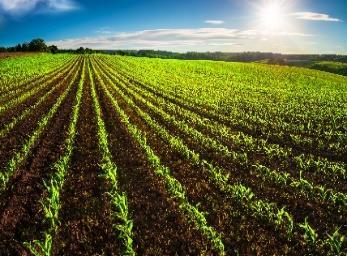
Contact: Lee Ann Jackson (TAD/ATM)
GLOBAL FORUM ON BIOTECHNOLOGY
The Global Forum on Biotechnology is one of 15 Global Fora created by OECD Committees. Global Fora are not official OECD bodies1, but are best described as broad communities or networks of stakeholders in specific areas of responsibility of one or more Committees. The capacity of OECD Committees to accommodate non-Member Partners as Participants or Associates being limited, the Global Fora provide platforms for peer learning and policy dialogue on issues which require interaction with Partners world-wide. They can also promote multidisciplinary and horizontal approaches beyond the scope of any single Committee and foster partnerships with other intergovernmental organisations.
OECD Global Fora bring together government officials, policy analysts, business leaders, academic experts, researchers and various other stakeholders. Many Global Forum meetings are major events, attracting large numbers of participants from different regional and cultural backgrounds. They contribute to create active networks of policy makers in Member and Partner economies, to build consensus on what are the most effective policies and to identify “next-generation” issues. The principal functions of Global Fora are to:
➢ Help the Committees identify relevant issues, including newly emerging ones;
➢ Promote a convergence of views on the Committees’ outputs among a broad range of Members and Partners;
➢ Ensure that these outputs are known and used among these stakeholders;
➢ Share best practices in the implementation of the results.
The Global Forum on Biotechnology supports the activities and networks in the field of biotechnology developed by 1) the Committee for Scientific and Technological Policy, and 2) the Chemicals and Biotechnology Committee. For instance, the Global Forum on Biotechnology provides the adequate framework to support the participation of several delegates from non-Member countries in the plenary meetings and associated activities of the Working Party on the Harmonisation of Regulatory Oversight in Biotechnology, as well as the Working Party for the Safety of Novel Foods and Feeds.
Website: General information on the Global Fora: http://www.oecd.org/global-relations/globalforums/
Contact: Bertrand Dagallier (ENV/EHS)
1 Except the Global Forum on Transparency and Exchange of Information for Tax Purposes which is governed by different rules than the OECD's other Global Fora

7
HARMONISATION OF REGULATORY OVERSIGHT IN BIOTECHNOLOGY
The OECD’s Working Party on the Harmonisation of Regulatory Oversight in Biotechnology (WP-HROB) deals with the environmental safety of transgenic organisms (plants, animals, micro-organisms). The work aims to ensure that the types of elements used in biosafety assessment, as well as the methods to collect such information, are as similar as possible amongst countries. This improves mutual understanding and harmonised practice, which in turn, increases the efficiency of the biosafety assessment process, limits duplication of effort, while reducing barriers to trade.
The WP-HROB participants are mainly officials from OECD countries responsible for the environmental risk/safety assessment of products derived from modern biotechnology. Observer delegations and invited experts collaborate actively, given the use of biotech products and breeding activities worldwide. They include candidate countries and other partner countries interested (in recent years: Argentina, Brazil, Croatia, India, Kenya, Paraguay, Philippines, South Africa, Thailand, Uruguay, Viet Nam); Business at OECD (BIAC); other inter-governmental and expert organisations such as FAO; UNEP; the Convention on Biological Diversity Secretariat; the African Biosafety Network of Expertise (AUDA NEPAD-ABNE), the Agriculture and Food Systems Institute (AFSI), the Public Research and Regulation Initiative (PRRI). The 37th meeting of the WP-HROB was held in April 2023, with a large participation from 39 delegations.
The publication of OECD Consensus/Guidance Documents remains a major output of the programme. They constitute a set of practical tools for regulators and biosafety assessors dealing with new transgenic varieties, with respect to environmental safety. The 60 Consensus Documents issued to date address the biology of crops, trees, animals and micro-organisms, as well as selected traits that have been introduced in plants. Other key issues in the context of environmental risk assessment are also covered
The consensus document on Environmental Considerations for risk/safety assessment for the release of transgenic plants will be published in July 2023, concluding many years of discussions led by Canada and WP-HROB Bureau. The document deals with the core of the biosafety work: it contains general information on environmental risk/safety assessment, its key concepts and structure when planning, and also examples gained from actual risk/safety assessment in seven annexes. It will be also included in the Safety Assessment of Transgenic Organisms in the Environment, Volume 10 to be published in July 2023 as well All these documents are available through the OECD BioTrack website (www.oecd.org/science/biotrack).
Works under development are as follows:
➢ Consensus documents:
o Revised wheat biology document (publication expected in the second half of 2023)
o Revised maize biology document
o Biology of mosquitoes Anopheles gambiae (publication expected in 2024), Anopheles albimanus and Anopheles stephensi (new projects) where engineered strains are being used to fight against malaria disease vectored by the insect
o Biology and use of phototrophic micro-algae for production purposes
In common with WP-SNFF:
➢ Update of the 1986 OECD Council Recommendation on the safety of recombinant DNA organisms
➢ Enhanced information exchange on New Breeding Techniques (approved in October 2022, first Survey conducted in January 2023)
➢ Moving towards “safe(r)-innovation-approach” in the context of modern biotechnology, project approved in April 2023 following a two-year pilot project having focused on 2 case studies.
Upcoming events
• 38th Meeting of the Working Party on the Harmonisation of Regulatory Oversight in Biotechnology, 20-22 March 2024
8
• 39th Meeting of the Working Party on the Harmonisation of Regulatory Oversight in Biotechnology, 24-26 March 2025
Recent publications:
Developments in Delegations on Biosafety Issues, April 2021- May 2022 (2022)
Safety Assessment of Transgenic Organisms in the Environment, Volume 9 –OECD Cons. Doc. on the Biology of Crops: Apple, Safflower, Rice (2022)
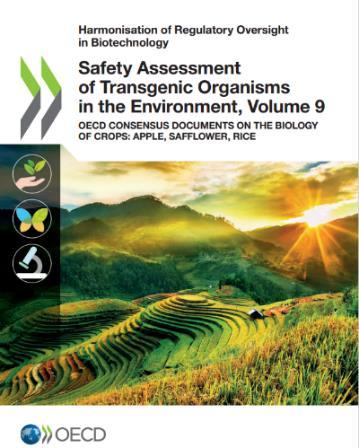
Website: BioTrack Online www.oecd.org/science/biotrack
Contacts: Akihiro Kagoshima, Bertrand Dagallier, Ryoko MachidaHirano (ENV/EHS)
SAFETY OF NOVEL FOODS AND FEEDS
The OECD Working Party for the Safety of Novel Foods and Feeds (WP-SNFF) addresses aspects of the safety assessment of foods and feeds derived from genetically engineered crops. The work aims to ensure that the types of elements used in risk/safety assessment, as well as the methods to collect such information, are as similar as possible amongst countries. The approach is to compare transgenic crops and derived products with similar conventional ones that are already known and considered safe in their use, based on recognised experience. Harmonised methods and practice, as well as share of data are facilitated through the WP-SNFF activities. The 30th meeting of the WP-SNFF was held in April 2023, with a large participation from 32 delegations.
Consensus documents
The main output is the set of consensus documents on compositional considerations for new varieties of specific crops. These documents compile a common base of scientific information on the major components of the plants and their derived products: key nutrients; toxicants; anti-nutrients; and other plant metabolites where relevant. Other publications deal with general aspects to facilitate harmonisation in safety assessment. These documents constitute practical tools for regulators and risk assessors dealing with new transgenic varieties, with respect to human food and animal feed safety. To date, 28 Consensus Documents have been published on major crops and mushrooms, the animal feedstuffs, as well as the molecular characterisation of plants derived from modern biotechnology developed in common with the WP-HROB They are available through the OECD BioTrack website (www.oecd.org/biotrack).
A new document on Considerations for collaborative work on the safety assessment of foods and feeds derived from rDNA plants will be published in the second half of 2023. Two composition documents, on maize (revision) and faba bean (Vicia faba), are under development Joint projects conducted with the WP-HROB are the update of the 1986 OECD Council Recommendation on the safety of recombinant DNA organisms, the enhanced information exchange on New Breeding Techniques, and the project on moving towards “safeby-design” in the context of modern biotechnology.
Outreach and Engagement of Non Member Economies
Officials from OECD countries and delegates from the European Food Safety Authority (EFSA), Business at OECD (BIAC), observer organisations such as FAO, UNEP, the African Biosafety Network of Expertise (AUDA NEPAD-ABNE) and the Agriculture and Food Systems Institute (AFSI), Health and Environmental Sciences Institute (HESI) participate actively in the novel food and feed safety programme. In addition, the WP-SNFF has increasingly involved the experience, scientific knowledge and interests of non-member
9
economies, which allows it to address a wider range of food and feed products of global interest. Brazil, South Africa and Thailand, for example, were actively involved in the drafting of consensus documents on compositional considerations for cowpea, cassava, papaya as well as other tropical crops. The WP-SNFF benefits also from the expertise from Argentina, Croatia, India, Kenya, Paraguay, Philippines, Uruguay and Viet Nam.
Upcoming events:
• 31st Meeting of the Working Party for the Safety of Novel Foods & Feeds, 18-20 March 2024
• 32nd Meeting of the Working Party for the Safety of Novel Foods & Feeds, 26-28 March 2025
Recent publications:
Developments in Delegations on the Safety Assessment of Novel Foods and Feeds, April 2021 – May 2022 (2022)
Website: BioTrack Online www.oecd.org/biotrack
Contacts: Ryoko Machida-Hirano, Bertrand Dagallier, Akihiro Kagoshima (ENV/EHS)
BIOTRACK ONLINE
The BioTrack Online information system is a mechanism by which the Working Party on the Harmonisation of Regulatory Oversight in Biotechnology and the Working Party for the Safety of Novel Foods and Feeds make publicly available the outputs of their work, especially their Consensus/Guidance Documents described in sections above.
BioTrack Online offers also a public access to the “Product Database”. This database allows regulatory officials to easily share basic information on transgenic products derived from the use of modern biotechnology (mainly crop plants) and approved for commercial application in terms of food, feed or environmental safety. The database is updated, on a voluntary basis, by authorities of countries participating in the OECD biosafety activities. Products are listed with unique identifiers, and the information includes common/scientific names of the host organism and introduced genes, the events and traits, the regulatory elements and relevant links regarding approvals for release and use in countries.
Information on new or updated entries provided by Argentina, Australia, Canada, South Africa European Union and Paraguay were added to the Product Database in the first half of 2023. Currently, the database includes 393 products of transgenic crops, trees and flowers, from a total of 26 plant species (plum and pineapple as new species), these products being approved in one or several of 17 countries and the European Union.
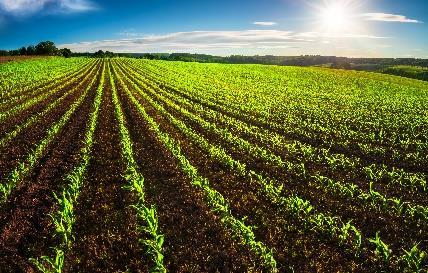
BioTrack Online also contains the regulatory contacts of OECD member countries and other stakeholders involved in biosafety and novel food/feed safety.
The co-operation continues between the OECD’s Product Database, the CBD Biosafety Clearing-House and the FAO GM Food Platform, for interoperability between these web-based systems and facilitating the exchange of information on safety assessment of transgenic organisms and foods. This activity responds to a request from the Codex ad hoc Task Force on Food Derived from Biotechnology, and a Memorandum of Cooperation signed between OECD and the Secretariat of the Convention on Biological Diversity.
Website: BioTrack Online www.oecd.org/biotrack
Product Database https://biotrackproductdatabase.oecd.org/
Contacts: Akihiro Kagoshima, Bertrand Dagallier (ENV/EHS)
10
BIODIVERSIY ECONOMICS AND POLICY
Biodiversity work at the OECD focuses on the economics and policies needed to promote the effective conservation and sustainable use of biodiversity. It includes areas such as biodiversity valuation, the use of economic instruments and other policy measures, biodiversity mainstreaming and finance. This programme also supports the Convention on Biological Diversity (CBD). The work is conducted under the oversight of the OECD Working Party on Biodiversity, Water and Ecosystems (WPBWE), a subsidiary body of the Environment Policy Committee (EPOC).
Biodiversity, including forests, wetlands and marine ecosystems, is fundamental to sustaining life. Biodiversity provides critical ecosystem services such as food provisioning, water purification, nutrient cycling, and climate regulation, all of which are essential to support human well-being and economic growth. Despite the significant economic, social and cultural benefits provided by biodiversity and ecosystem services, global biodiversity is declining.
The OECD released a working paper on “Identifying and assessing subsidies and other incentives harmful to biodiversity: A comparative review of existing national level assessments and insights for good practice” in November 2022. The paper reviews the existing national level studies undertaken to identify and assess incentives harmful to biodiversity or the environment more broadly, and concludes with good practice insights for any other countries wishing to undertake similar studies (as called for under the Convention on Biological Diversity).

A report Biodiversity, Natural Capital and the Economy: A Policy Guide for Finance, Economic and Environment Ministries, prepared at the request of the UK G7 Presidency, was released in 2021. The report provides the latest findings and policy guidance for G7 and other countries in four key areas: measuring and mainstreaming biodiversity; aligning budgetary and fiscal policy with biodiversity; embedding biodiversity in the financial sector; and improving biodiversity outcomes linked to international trade.
The analysis in Tracking Economic Instruments and Finance for Biodiversity - 2021, updated in September 2021, highlights trends in the use of biodiversity-relevant economic instruments - such as taxes, fees and charges, tradable permits, and environmentally-motivated subsidies - and the finance they mobilise, based on available data in the OECD Policy Instruments for the Environment (PINE) database. These data have been used to monitor progress towards CBD Aichi Target 3 and Sustainable Development Goal (SDG) Target 15.a.1 on biodiversity finance. They are also relevant for Target 18 in the draft post-2020 Global Biodiversity Framework in the context of positive incentives.
The policy paper Enhancing the effectiveness of sub-national biodiversity policy: Practices in France and Scotland, United Kingdom, was published and presented on Nature Day at UNFCCC COP26 in 2021. Drawing on policy practices from Scotland (UK), France and other signatories to the Edinburgh Declaration, this paper provides an overview and analysis of sub-national biodiversity strategies and plans; mechanisms to ensure policy coherence and co-ordination; and policy instruments that subnational governments can leverage to deliver on biodiversity outcomes.
On-going OECD work on biodiversity is focussing on Biodiversity and Green Budgeting Tagging; on Mainstreaming Biodiversity into Renewable Energy Infrastructure Sector; and on Developing a Supervisory Framework for Financial Risks Stemming from Biodiversity-related Losses, with funding from the European Union. First output was the policy paper Assessing biodiversity-related financial risks. Navigating the landscape of existing approaches that was issued in April 2023.
11
Recent publications and working papers:
OECD (2022), Identifying and assessing subsidies and other incentives harmful to biodiversity at national level: A comparative review of existing national level assessments and insights for good practice.
OECD (2021), Biodiversity, natural capital and the economy: A policy guide for finance, economic and environment ministers.
OECD (2021), Tracking economic instruments and finance for biodiversity - 2021
OECD (2021), Enhancing the effectiveness of sub-national biodiversity policy: Practices in France and Scotland, United Kingdom
Website: www.oecd.org/environment/resources/biodiversity/
Contacts: Katia Karousakis, Edward Perry (ENV/ETR)
REGULATION OF EXTERNALLY APPLIED dsRNA-BASED PRODUCTS FOR PEST MANAGEMENT
The OECD Conference on Regulation of Externally Applied dsRNA-based Products for the Management of Pests was held at the OECD Headquarters in April 2019. The event benefitted from financial support from the OECD Co-operative Research Programme: Biological Resource Management for Sustainable Agricultural Systems (CRP).
The Expert Group on RNAi-based pesticides (EGRNAi) – a sub-body of the OECD Working Party on Pesticides - organised the conference and coordinated the preparation of the conference with the Federal Office of Consumer Protection and Food Safety (BVL) in Germany, the European Food Safety Authority, Health Canada and the US Environmental Protection Agency.
The full proceedings of the conference have been published online at the Frontiers Research Topic RNAi Based Pesticides. This special issue contains papers prepared after the conference by the speakers, and the conference report (2020) that summarises input from presenters and participants during the panel discussions at each session. Key elements from these discussions have already been incorporated into the OECD Working Document on Considerations for the Environmental Risk Assessment of the Application of Sprayed or Externally Applied ds-RNA-Based Pesticides, Series on Pesticides No.104 (2020). It will facilitate regulators in evaluating externally applied dsRNA-based products for potential environmental risks.
The second OECD Working Document on Considerations for the Human Health Risk Assessment of Externally Applied ds-RNA-Based Pesticides, Series on Pesticides No.110, published in June 2023, includes the lessons learned from the application of this technology in the field of pharmaceuticals and considers a range of issues directly relevant to human exposure arising from the application of externally-applied dsRNAbased pesticides, and discusses possible effects of dsRNA exposure in mammals.
Publications and working papers:
RNAi Pesticides (several authors) (2019-2021), full proceedings of the 2019 OECD conference on RNAi based pesticides
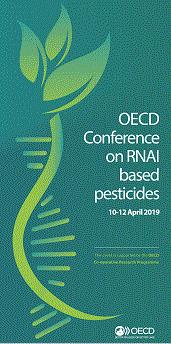
OECD (2020), Considerations for the Environmental Risk Assessment of the Application of Sprayed or Externally Applied ds-RNA-Based Pesticides.
Mendelsohn et al. (2020), Summary of Discussions From the 2019 OECD Conference on RNAi Based Pesticides.
OECD (2023), Working Document on Considerations for the Human Health Risk Assessment of Externally Applied ds-RNA-Based Pesticides
Website: http://www.oecd.org/chemicalsafety/pesticides-biocides/conference-on-rnai-based-pesticides.htm
Contacts: Magda Sachana, Patience Browne (ENV/EHS)
12
CONFERENCE ON INNOVATING MICROBIAL PESTICIDE TESTING
The Expert Group on Biopesticides (EGBP) – a sub-body of the OECD Working Party on Pesticides –organised an OECD Conference on Innovating Microbial Pesticide Testing that took place at the OECD Headquarters on 13-16 September 2022. This conference benefitted from a grant from the OECD Cooperative Research Programme (CRP): Sustainable and Food Agricultural Systems. The OECD Secretariat and the EGBP Chair from the US Environmental Protection Agency coordinated preparations, including the development of two background documents prepapred by experts from OECD member countries outlining the challenges and future opportunities for testing and for assessing the safety of microbial pesticides with respect to both human health and non-target organisms.
Microbial pesticides are microorganisms (e.g., bacteria, fungi, viruses) that are used to control a wide range of agricultural pests, including plant disease-causing microorganisms, fungi, insects, and weeds. These pesticides are important components of a sustainable agriculture strategy because they generally have a lower risk profile and are more selective for targeted pests compared to conventional chemical pesticides. However, microbial pesticide hazard testing is challenging, as current test guidelines were developed for chemical pesticides and do not take into account microbial pesticides’ unique properties. Using the current test guidelines for microbial pestcides can produce study results that are inconsistent, difficult to interpret.
The goal of the conference was to develop, agree upon, and develop a workplan to improve current test guidelines for microbial pesticides. This includes:
• improving test guidelines to evaluate potential effects of microbial pesticides on nontarget organism (e.g., birds, fish, bees), and
• establishing a framework using NAMs and/or other novel approaches in lieu of mammalian test guidelines to evaluate the effects of microbial pesticides on human health.
The Conference programme, abstracts, speakers’ biographies and other conference materials are available on the conference website. The full proceedings of the conference with papers prepared subsequently by each of the speakers, were published in June 2023 and are available here
Publications:
OECD (2023) Innovating Microbial Pesticide Testing: Conference Proceedings
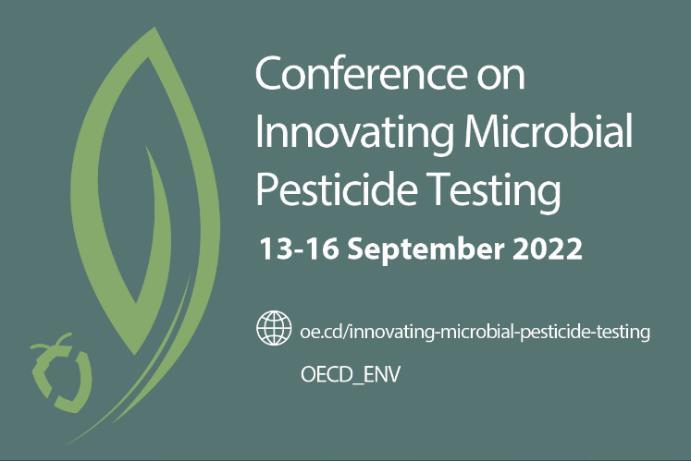
Website: https://oe.cd/innovating-microbial-pesticide-testing
Other relevant EGBP activities: The EGBP is currently developing an OECD Guidance Document on Baculoviruses as Plant Protection Products This will complement the Consensus Document on Information Used in the Assessment of Environmental Applications Involving Baculoviruses [ENV/JM/MONO(2002)1] published by the Working Party on the Harmonisation of Regulatory Oversight in Biotechnology in 2002. Only a few additional, publically available safety studies have been carried out during the last 20 years, but the new Guidance Document will extend the 2002 Consensus Document by referring to new knowledge on the biology of baculoviruses, as well as the describing experiences using baculovirus as a plant protection agent. The document is expected to be published later in 2023.
Website: https://www.oecd.org/chemicalsafety/pesticides-biocides/biological-pesticides.htm
Contacts: Magda Sachana, Patience Browne (ENV/EHS)
13
POLICIES FOR ENGINEERING BIOLOGY IN AN INTERNATIONAL CONTEXT
Whilst there is no agreed to definition, Engineering Biology can be considered as an approach that designs, fabricates, scales and embeds biological components and systems into useful applications. Engineering biology is a field that promises solutions to many current and future global challenges, including treating or eradicating infectious and genetic diseases, preventing food shortages, enabling sustainable manufacturing, and mitigating the impacts of climate change, among many others. Potential applications include alternative protein sources such as plant-based and other synthetic meats (a solution for food security), gene editing of insects (to eradicate Malaria), scaled production of microorganisms (for carbon dioxide removal) and rapid vaccine development (such as RNA vaccines).
The OECD Working Party on Biotechnology, Nanotechnology and Converging Technologies (BNCT) hosted a scoping workshop on Engineering Biology 10 May 2023 in Paris. This workshop acted as a first stocktaking of engineering biology as a policy field as well as a “forward look” to better anticipate policy needs in the future. To this end, the workshop took a broad perspective on engineering biology to identify key developments, policies and governance challenges and to explore opportunities for international cooperation and coordination. Workshop sessions included the following topics:
• Transformative changes to come – looking forward to impactful engineering biology
• National engineering biology strategies
• Investment approaches to, and the status of, synthetic biology and biomanufacturing
• Anticipatory governance and responsible research and innovation in engineering biology
• Training and international mobility
• Global communities and cooperation
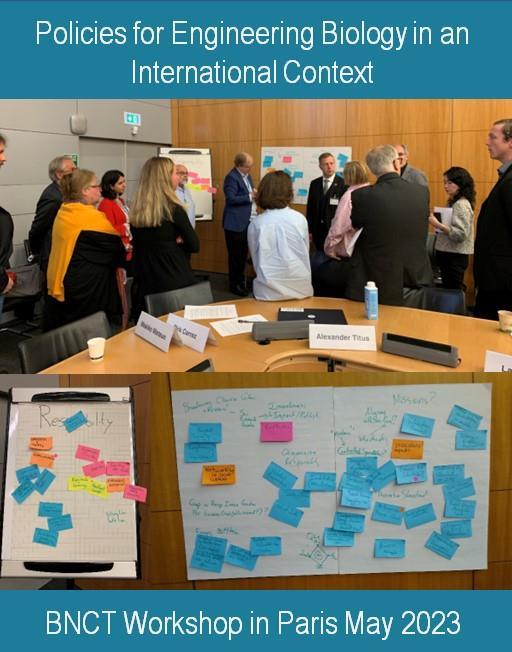
A workshop report is envisaged drawing out reflections on, and open questions about, the above topics.
Contact: Douglas Robinson (STI/STP)
OECD GLOBAL FORUM ON TECHNOLOGY – INAUGUAL EVENT WITH PLENARY PANEL ON SYNTHETIC BIOLOGY
On 6 June 2023, the inaugural event of the OECD Global Forum on Technology took place at OECD headquarters in Paris. Organised in the margins of the Meeting of the OECD Council at the Ministerial Level, the event brought together over 300 senior policy makers, leading technology experts, and a wide variety of stakeholders from more than 50 countries to discuss the shaping of our future at the tech frontier.
A set of three breakout sessions probed the implications of emerging technology through the lenses of three policy themes: human rights, climate change, and technological divides. In the afternoon, the Forum took a “deep dive” into two specific technologies: synthetic biology (next generation biotechnology) and immersive technologies (such as extended and virtual reality).
The panel in the Synthetic Biology plenary session was composed of Drew Endy (Stanford scientist and BioBricks President), Matthew Chang (scientists at National University of Singapore), Benson Mburu (National Commission for Science, Technology and Innovation in Kenya), Kenneth Oye (MIT Professor of Political Science), and Claudia Vickers (Professor at Queensland University of Technology).
14
Drew Endy presented the synthetic biology field in a nutshell in his keynote, explaining that advances are exponential and carry high promises at the medical, agricultural, and industrial levels. Though there are many challenges today. To address these, speakers underlined that appropriate governance mechanisms need to accompany these technology advances. Moreover, they elaborated that synthetic biology should encapsulate values of inclusivity, solidarity, sustainability, and humility. Without these, the scientific community could face issues of dual-use and of exclusion of the Global South. To ensure access and equity, the panellists agreed that stakeholders should prioritize applications that are easily scalable. Concretely, they discussed five potential impact areas of synthetic biology applications in reaching zero emission goals, these include emissions reduction and reutilisation, bio-based materials, carbon sequestration and waste recycling. such as carbon sequestration and zero-emission technologies.
In concluding, the panel highlighted that despite the potential for transformative applications, synthetic biology technologies face barriers such as their translating from universities to application. This could be overcome by scale-up investment and highlights the important role of public and private funders. In terms of necessary policy interventions, the panellists discussed that the role of guardrails and self-governance mechanisms as well as the important role of coordinated frameworks and international conventions for which OECD could be well placed to drive future efforts.
All replays and event materials are accessible online at oe.cd/gftech
Contact: David Winickoff (STI/STP), Laura Kreiling (STI/STP)
BIOTECHNOLOGY STATISTICS
The OECD Key Biotech Indicators (KBI) and the OECD Key Nanotech Indicators (KNI) were updated in November 2022. They will be updated again in November.
The KBI are available at: oe.cd/kbi and the KNI data are available at: oe.cd/kni
Contact: Brigitte van Beuzekom (STI/STP)
BIOENERGY AND BIOFUELS AT TRADE AND AGRICULTURE DIRECTORATE
The subject of bioenergy touches various areas, in particular, scientific developments, environmental effects, energy balances and agricultural market economics. The Trade and Agriculture Directorate (TAD) work on bioenergy focuses on a comprehensive compilation of data and information, the categorisation of the variety of support policies and the quantitative analysis of bioenergy markets and policy measures.
An economic assessment of biofuel support policies, published in 2008, concluded that government support of biofuel production in OECD countries was costly, with a limited impact on reducing greenhouse gases and improving energy security, however with a significant impact on world crop prices. The study highlighted that other forms of bioenergy, such as bioheat, biopower and biogas, could represent economically more viable and environmentally more efficient ways to reduce GHG. Another publication presented the technology and costs associated with the bioheat, biopower production as well as second generation biofuels.
An OECD study published in 2010 focused on the development and the environmental performance of those alternative forms of energy. They are mostly generated with non-agricultural feedstocks and, to a lesser extent, agricultural residues and wastes. Main technologies to convert biomass to heat and/or electrical
15
power include the direct combustion, the gasification and the anaerobic digestion producing biogas. Combined heat and power generation plants allow improving the energy efficiency with the use of the remaining heat after power generation for space heating or in industrial applications.
The OECD-FAO Agricultural Outlook annual report covers biofuel market and related policy developments. The 2023 Agricultural Outlook (projecting on the 2023-2032 period) is available at http://www.agri-outlook.org/, see ‘Biofuels’ chapter (OECD/FAO, 2023).
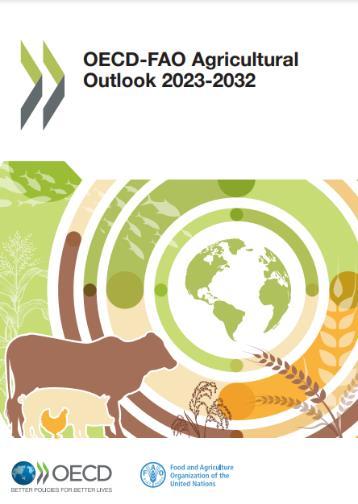
TAD has created a detailed database of policies in the fertiliser and biofuel sectors of OECD countries and several Emerging Economies available at http://www.oecd.org/tad/agricultural-policies/supportpolicies-fertilisers-biofuels.htm. An analysis of these policies and their implications for agricultural markets and incomes has been published within the Food, Agriculture and Fisheries Paper series (von Lampe et al., 2014). A previous Trade and Environment Working Paper has focused on domestic incentive measures for renewable energy with possible trade implications (Bahar, Egeland and Steenblick, 2013).
TAD participates in the Agricultural Market Information System (AMIS) project (www.amis-outlook.org). One of TAD’s contributions to AMIS is to report each month on newly implemented biofuel policies in the AMIS countries in the Market Monitor Report.
Recent Publication:
OECD/FAO (2023), OECD-FAO Agricultural Outlook 2023-2032 – “Biofuels” chapter, full document available at: http://www.agri-outlook.org/
Website: http://www.oecd.org/tad/agricultural-trade/bioenergy.htm
AMIS Market Monitor Report: http://www.amis-outlook.org/amis-monitoring/monthly-report/en/
Contacts: Annelies Deuss (TAD/ATM), Martin Von Lampe (TAD/PTA)
BIOENERGY AT THE INTERNATIONAL ENERGY AGENCY (IEA)
The activities of the International Energy Agency (IEA) cover bioenergy across the electricity, heat and transport sectors. The following summarize notable activities in 2023.
Renewables Market Update 2023
On June 1st the IEA released its Renewable Market Update for 2023. There were four dedicated questions on biofuels.
1. Will energy security concerns drive biofuel growth in 2023-2024?
Biofuel demand is to expand by 11% by 2024, supported by existing policies targeting energy security objectives. Only Indonesia and Brazil are accelerating deployment by 2024. In advanced economies, new policies are not likely to influence production until after 2024 as high prices, feedstock concerns and technical constraints limit additional growth potential.
2. Where were governments able to rely on biofuels to secure energy supplies during the 2022 energy crisis?
Biofuels avoided the consumption of 2 million barrels of oil equivalent per day (mboe/d) in 2022, equivalent to 4% of global transport sector oil demand. Argentina, India and Indonesia all accelerated biofuel use in 2022. However, while biofuels offered energy security benefits, their prices
16
climbed more quickly than those of gasoline and diesel in many countries. To mitigate increases in transport fuel costs, Brazil, Sweden and Finland delayed planned increases to biofuel blending obligations in 2022.
3. Will we see lower biofuel prices in 2023-2024?
Biofuel prices are set to decline in 2023 and 2024 while remaining well above pre-Ukraine war levels. Biofuel prices have declined in all major markets from their peaks in 2022. In the first four months of 2023, ethanol prices declined 7%-16% from their 2022 average and biodiesel prices dropped 15%-28% across different markets. While below 2022 peaks, prices for major biofuel feedstocks such as corn, sugar and vegetable oils are expected to remain above pre-war price levels, keeping biofuel prices at historically high levels through 2024.
4. What are governments and companies doing to avoid a supply crunch and is it enough?
We expect the largest-ever expansion in new biofuel technology capacity to 2030. Planned and announced projects would more than triple the capacity of facilities using unconventional feedstocks. While impressive, these efforts are not yet enough to avoid a feedstock supply crunch over the medium term.
The Biofuture Initiative and Campaign participated in the CEM senior officials meeting and hosted 3 independent workshops.
• CEM Senior Officials Meeting: Platform members hosted two discussions, one to set priorities for 2023-24 and the other to coordinate clean fuels work across CCUS, hydrogen, zero emission and biorefineries.
• Biomass and EU Energy Security Workshops: Two half day workshops on gaseous fuels and woody biomass and the second on liquid biofuels and bio-based chemicals/materials.
• Exploring the feedstock supply crunch for liquid biofuels: A 2 hour discussion with industry members on feedstock availability for liquid biofuels and policy options to help expand feedstock supply.
The IEA has updated both its CCUS projects database and Clean energy demonstration project database.
• CCUS project database: The IEA established this dataset as part of its efforts to track advances in carbon capture, utilisation, and storage (CCUS). It covers all CO2 capture, transport, storage, and utilisation projects worldwide that have been commissioned since the 1970s, and have an announced capacity of more than 100 000 t per year (or 1 000 t per year for direct air capture facilities). It includes projects with a clear emissions reduction scope, and excludes CO2 capture for utilisation pathways which bring low climate benefits (e.g. food and beverages), or which are part of the conventional industrial process (e.g. internal use for urea production), as well as use of naturally occurring CO2 for enhanced oil recovery.
• Clean energy demonstration project database: The IEA Demonstration Projects Database seeks to map major demonstration projects of clean energy technologies, globally. For each project, it provides information on location, sector and technology grouping, status, capacity, timing and funding, when available.
Recent publications:
IEA (2023), Renewable Market Update https://www.iea.org/reports/renewable-energy-market-update-june-2023
Clean Energy Ministerial (2023) Biofuture Platform. https://biofutureplatform.org/
IEA (2023) CCUS project database https://www.iea.org/data-and-statistics/data-product/ccus-projects-database
IEA (2023) Clean energy demonstration project database: https://www.iea.org/data-and-statistics/data-tools/cleanenergy-demonstration-projects-database
Contact: Jeremy Moorhouse (IEA/EMS/RED)
17
POLICIES FOR AGRICULTURAL INNOVATION
The Ministerial Declaration on Transformative Solutions for Sustainable Agriculture and Food Systems
The Declaration underlines the key role of developing transformative and innovative policies towards more sustainable and resilient agriculture and food systems. To this end, it calls the OECD to strengthen the assessment of investments in agricultural innovation systems that offer cost-effective levers to progress towards productive, sustainable, and resilient agriculture and food systems.
The OECD Agro-food Productivity Sustainability Resilience policy framework
Innovation in agriculture is a key driver to improve the productivity and environmental sustainability of the sector. Innovative technologies and practices allow food systems to produce more food for a growing world population, using less resources and reducing the pressures on the environment. Innovation can make food systems more resilient to systemic shocks exacerbated by climate change, including sudden outbreaks like COVID-19 pandemic. The Agro-food ProductivitySustainability-Resilience policy framework responds to a demand from the G20 in 2012 and to the Communiques from the OECD Agricultural Ministerial meeting in 2016. It is currently a ready-to-use instrument to analyse the performance of agricultural policies from a holistic perspective and their contribution to enhance innovative outcomes.
Digital agriculture

Digitalisation offers the potential to help address the productivity, sustainability and resilience challenges facing agriculture. The adoption of digital agriculture in OECD countries faces common barriers including technology costs, user-friendliness, human capital requirements, operational relevance, perceived risks, and mistrust of technologies with heavy reliance on algorithms and automation. National governments have an important role in addressing bottlenecks to adoption, in particular to build trust on data privacy, security, and confidence in data sharing; misaligned incentives of sellers and buyers of digital technologies; difficulty in learning how to unwrap “black box” technologies; and lack of standards for comparing and certifying the operation of digital technologies. Two recent publications – a literature review and an “issues note” on trust- address these issues
Agriculture Innovation Systems
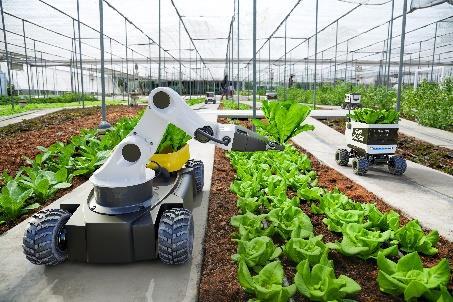
Recognising the potential role of biotechnologies in increasing productivity and facilitating adaptation to climate change, the OECD Trade and Agriculture Directorate (TAD) has analysed agricultural innovation systems and the role of policies in fostering innovation. After three pilot country reviews published in 2015 (Australia, Brazil and Canada), the framework was used in a number of country reviews: the Netherlands (2015), Türkiye and the United States (2016), P.R. China, Estonia, Korea and Sweden (2018), and Japan and Latvia (2019). Furthermore, three additional country studies of Argentina (2019), Norway (2021) and Viet Nam (2022) have also a focus on agriculture innovation applying the revised framework.
The main findings and policy recommendations from the country reviews achieved since 2015 were published in 2019 (OECD, 2019). A booklet containing an overview of the main findings and a policy brief were made available at an OECD seminar organised on 11 May 2019 before the G20 Meeting of Agricultural Ministers in Niigata, Japan. The reviews for the Netherlands, Spain, and the European Union will be available in mid-2023.
18
Farm Level Analysis Network and Network on Agricultural TFP and the Environment
Innovation can provide an opportunity for agriculture producers to increase productivity while better managing natural resources. To broaden the understanding of these interlinkages, the OECD has established two networks of experts from research and government.
The Farm-Level Analysis Network undertakes studies and exchange of experience on the use of micro level data for policy analysis. A series of reports investigating the determinants of farm productivity and sustainability performance and dynamics, including innovation and agricultural policies have been discussed in the Network and published in the OECD Food, Agriculture and Fisheries Paper series
The Network on Agricultural TFP and the Environment provides experts with a platform to discuss challenges and opportunities of measuring the sustainable productivity growth through “environmentally-adjusted” Total Factor Productivity (TFP) indicators. Discussions on the recent methodological developments and best measurement practices were concluded with the publication of “Insights into the Measurement of Agricultural Total Factor Productivity and the Environment” (OECD, 2022; Bureau and Antón, 2022).
Recent publications
Sauer, J. and J. Antón (2023), "Characterising farming resilience capacities: An example of crop farms in the United Kingdom", OECD Food, Agriculture and Fisheries Papers, No. 195, OECD Publishing, Paris, https://doi.org/10.1787/1e26883b-en
Bureau, J. and J. Antón (2022), "Agricultural Total Factor Productivity and the environment: A guide to emerging best practices in measurement", OECD Food, Agriculture and Fisheries Papers, No. 177, OECD Publishing, Paris, https://doi.org/10.1787/6fe2f9e0-en
McFadden, J., et al. (2022), "The digitalisation of agriculture: A literature review and emerging policy issues", OECD Food, Agriculture and Fisheries Papers, No. 176, OECD Publishing, Paris, https://doi.org/10.1787/285cc27d-en
McFadden, J., F. Casalini and J. Antón (2022), "Policies to bolster trust in agricultural digitalisation: Issues note", OECD Food, Agriculture and Fisheries Papers, No. 175, OECD Publishing, Paris, https://doi.org/10.1787/5a89a749-en
OECD (2022), “Insights Into the Measurement of Agricultural Total Factor Productivity and the Environment”, https://www.oecd.org/agriculture/topics/network-agricultural-productivity-and-environment
OECD (2022), “Innovation, Agricultural Productivity and Sustainability in Viet Nam”, Chapter 5 on the Agricultural knowledge and innovation system, https://www.oecd-ilibrary.org/agriculture-and-food/innovation-agriculturalproductivity-and-sustainability-in-viet-nam_9cc1f47a-en
OECD (2021), “Policies for the Future of Farming and Food: How to improve productivity, sustainability and resilience?” (Booklet on PSR Policy Framework), https://issuu.com/oecd.publishing/docs/policies_for_the_future_of_farming_and_food
OECD (2021), “Policies for the Future of Farming and Food in Norway”, Chapter 4 on the Agricultural Innovation System, https://doi.org/10.1787/20b14991-en
Sauer, J., et al. (2021), "Dynamics of farm performance and policy impacts: Case studies ", OECD Food, Agriculture and Fisheries Papers, No. 165, OECD Publishing, Paris, https://doi.org/10.1787/3ce71854-en
Anton, J. and J. Sauer (2021), “Dynamics of Farm Performance and Policy Impacts: Main Findings”, OECD Food, Agriculture and Fisheries Papers, No. 164, OECD Publishing, https://doi.org/10.1787/af1f4600-en
Website: http://www.oecd.org/agriculture/topics/agricultural-productivity-and-innovation/
Contact: Jesús Antón (TAD/ARP)
19
AGRICULTURAL SEED AND FOREST REPRODUCTIVE MATERIAL CERTIFICATION SCHEMES
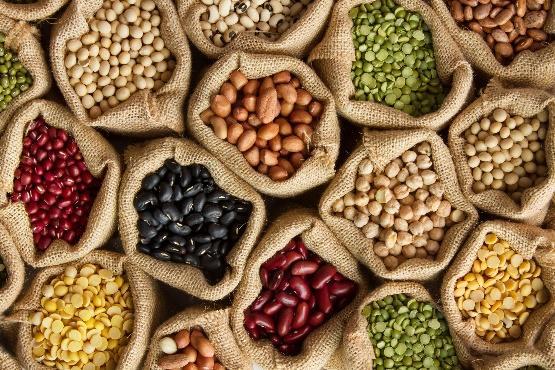
The following three criteria; distinctness, uniformity and stability are used for defining crop varieties and form the basis for agricultural seed development and trade. Identification and minimum purity criteria are important components of sustainability, especially in the case of hybridisation and genetic modifications. For forest reproductive material reliability depends on several factors including identification of origin (region or provenance), selection and breeding.
The OECD Seed Schemes are a set of international standards for field inspection and certification of the most important agricultural and vegetable species. The Schemes aim to harmonise seed certification; thereby facilitating and promoting international seed trade. The eight Seed Schemes establish rules and standards for varietal inspection and certification of seeds from OECD listed varieties. Sixty-one countries are currently a member of at least one of the Schemes.
The List of Varieties Eligible for OECD Certification covers 204 species – including all major crops – and more than 69 000 varieties. OECD statistics indicate that the total weight of OECD certified seeds traded corresponded to 1 billion kg in 2019/20. The electronic database provides an online search facility for OECD listed varieties and is available from the official website (see below).
In order to assess the current and future needs of international certification, the OECD Seed Schemes have established a number of Ad-Hoc Working Groups and holds regular discussions with their Technical Working Group to examine issues, explore new opportunities and develop new procedures. One of the key issues for the OECD Seed Schemes is the emerging role of biochemical and molecular techniques (BMT) in describing and identifying varieties. These issues are discussed at the Advisory Group on Biochemical and Molecular Techniques. The group plays a key role in the registration of new BMTs under the OECD Seed Schemes. The 2023 Annual Meeting held on 22-23 June 2023 approved new BMTs which are in use at least by one of the participating countries in the Seed Schemes. The Group also started discussions on how modern molecular techniques can be used for varietal purity tests. Currently the registered BMTs are only allowed for varietal identity tests but only as supplementary methods to phenotyping techniques.
International organisations such as OECD, International Union for the Protection of New Varieties of Plants (UPOV) and International Seed testing Association (ISTA) need to pursue these new techniques carefully in order to maintain the integrity of the seed sectors international regulatory framework. These organisations works in close cooperation to harmonise their work on BMTs as much as possible. Both OECD and UPOV have established their list of BMTS applied in breeding, variety testing and registration or seed certification. The organisations harmonised their approach during the formation of the lists.
The OECD Forest Seed and Plant Scheme encourages the production and use of forest reproductive material that has been collected, processed and marketed in a manner that ensures their trueness to name. It is currently implemented in 30 countries. The Scheme's rules were recently completed by including the "Tested" category and new types of basic materials, such as clones, clonal mixture and parents of families. Moreover, the Scheme is now adapted to deal with multifunctional forest trees.
The Scheme is exploring possible ways to adapt to and mitigate climate change. The scheme is collaborating with organisations such as Kew Gardens or EUFORGEN, to better understand and communicate the importance of the origin of forest reproductive material in afforestation reforestation and in forest tree plantations. The certification of origin is becoming more and more important as it provides information to foresters on the adaptation potential of the forest reproductive material. Some countries have introduced DNA based control systems to check the true origin (region of provenance) of the imported forest tree seeds, parts of plants or plants
20
The OECD Forest Seed and Plant Scheme is currently exploring the possibility of using biochemical and molecular techniques, particularly DNA based techniques in registration of basic material of forestry species under the OECD as well as the certification of origin and population of forest reproductive material
Upcoming events:
Agricultural Seed Schemes:
• Technical Working Group Meeting: 29 January – 2 February 2024, Livingstone, Zambia
• 2024 Annual Meeting of the OECD Seed Schemes: 10-14 June 2024, Nice, France
Forest Seed and Plant Scheme:
• 2023 Annual Meeting of the National Designated Authorities: 26-27 September 2023, OECD Headquarters
• Technical Working Group Meeting: 23-24 April 2024, Sweden (to be confirmed)
Recent publications:
OECD Seed Schemes: Rules and regulations; 2023 edition [fr.]: Systèmes des semences de l’OCDE : Règles et directives ; édition 2023
List of Varieties Eligible for Seed Certification; July 2023
OECD Forest Seed and Plant Scheme “2023” (Rules and Regulations) [fr.]: Système de l’OCDE pour les semences et plants forestiers “2023” (Règles et Directives)
Web sites: https://www.oecd.org/agriculture/seeds/ https://www.oecd.org/agriculture/forest/
Promotional video on the OECD Forest Scheme: https://youtu.be/nqGXYz5Sln4

Contact: Csaba Gaspar (TAD/COD)
CO-OPERATIVE RESEARCH PROGRAMME: SUSTAINABLE AGRICULTURAL AND FOOD SYSTEMS
The OECD Co-operative Research Programme (CRP) changed from the Co-operative Research Programme: Biological Resource Management for Sustainable Agricultural Systems to the Co-operative Research Programme: Sustainable Agricultural and Food Systems on 1 January 2021. This change reflects the current and emerging policy issues facing agriculture. The shift towards a food systems approach to policy analysis to tackle the “triple challenge” of providing food security and nutrition, and ensuring livelihoods while using natural resources sustainably is in line with the declaration adopted by Agriculture Ministers in 2016 and the work of the Committee for Agriculture. It is also fully aligned with OECD strategic objectives in relation to the need for integrated interdisciplinary approaches in obtaining sustainable solutions. The change in title does not affect CRP including fisheries and forestry research.
The CRP will have 28 participating OECD countries and is based on the observation that multi-disciplinary agri-food research is needed to address the gaps in knowledge, deepen understanding and enhance the scientific base of policy. The objectives of the CRP are the following: to provide a sound scientific knowledge base to agricultural policy-making; to contribute to an informed public debate on current and emerging agrofood issues and help resolve conflicting views; and to promote scientific understanding and standards between major regions of OECD.
Operational features of the Programme involve supporting and promoting international co-operation and networking in the field of basic and applied research. It awards fellowships to scientists from a CRP member
21
country to conduct research projects in another CRP member country, and supports financially workshops to address agro-food issues that are high on the science/policy agenda of Members. The CRP strategy emphasises the need to engage a range of scientific disciplines including the natural sciences, social sciences and the humanities in an interactive dialogue. The CRP has three pillars, or research themes, as depicted below:
The Call for Applications for funding of international conferences and workshops, and fellowships (individual research projects) in 2024 is now open, see details below. The fellowships awards are of particular interest for researchers taking a sabbatical. Applications for both fellowship and conference sponsorship are especially welcome on – but not restricted to – the following areas:
➢ Sustainable and resilient productivity growth and food security and nutrition;
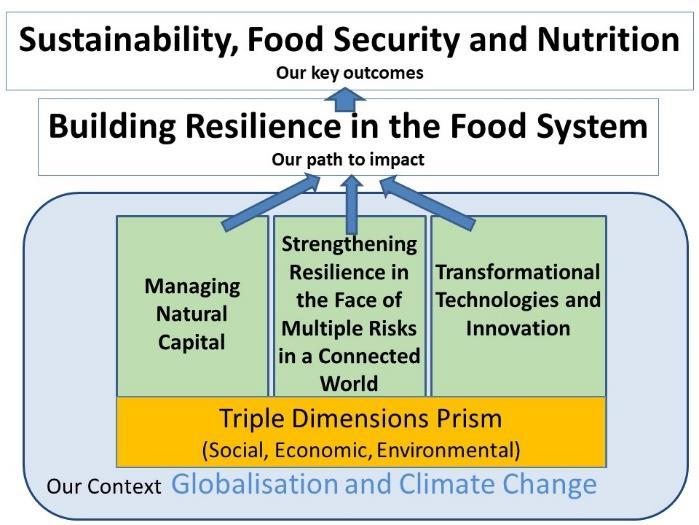
➢ Climate change mitigation, reducing emissions from agriculture and food systems, carbon sequestration in agriculture, forestry and land use;
➢ Halting and reversing forest loss and land degradation;
➢ Reducing the negative environmental impacts of livestock production and practices harmful to animal health and welfare, investigating the positive contribution livestock can make to soil quality and management, biodiversity and livelihoods;
➢ Biodiversity, enhancing ecosystem services;
➢ Improving soil health and water and air quality, including through agro-ecological and other innovative, context specific approaches.
➢ Innovations in the transfer and development of agricultural knowledge, including Indigenous and traditional knowledge;
➢ Fisheries and aquaculture productivity, sustainability and resilience.
CPR (Co-)Sponsored Conferences and Workshops taking place in 2023:
• Reducing nitrogen losses and greenhouse gas emissions from arable agriculture: How can new modelling concepts help? - Germany, 3-4 May 2023
• Innovative hydrothermal systems to valorise agricultural residuals: Roadmap towards implementation – achievements and barriers - Korea, 15-16 May 2023
• Antimicrobial use and resistance in livestock production in a One Health context
• Drone Spraying of Pesticides - United Kingdom, 23-24 May 2023
• Sustainability in Agriculture & Food Systems – Innovation, Indicators and ImplementationBelgium, 23-24 May 2023
• Beyond growth: Fishing for the future - United Kingdom, 3-14 June 2023
• The future role of ley-farming in cropping systems - Lithuania, 11-14 June 2023
• Food and feed for the future - France, 1 September 2023
22
• Combatting resistance using bacteriophages for eco-sustainable agriculture and food systemsSpain, 12-13 September 2023
• Ecosystem Based Fisheries Management (EBFM) in lobster and crab fisheries - Australia, 23-24 October 2023
Information about these are posted on the CRP website
CRP Fellowships in 2023 of particular interest to ICGB:
• Accelerating locally-developed freshwater management practices across global growing regions through innovation ecosystems
• Cost-effective controls for mitigating agricultural soil N2O emissions: Opportunities and uncertainties
• Developing a mountain peatland restoration manual: combining lessons from the UK and the USA
• Ecological rhizosphere management for enhanced nutrient efficiency, stress resilience and biodiversity in sustainable agro(ecosystems)
• Environmental monitoring using honey bee colonies and a novel sampling tool
• Land tenure models for carbon positive land use: comparative case studies between Scotland and New Zealand
• Near-Real time irrigation scheduling and crop biomass estimation through remote sensing images with high spatial and temporal resolution
• Using co-operative arrangements for learning from indigenous agricultural systems to enhance sustainability
• Analysing the economic impact of sustainable dietary diversification on consumer choices in the MED countries using nudging strategies
• Cost-effective diagnostic tests for a sustainable control of fasciolosis in ruminants and humans
• Developing a potent kairomone for the European grapevine moth, Lobesia botrana
• Innovative approach to remove seafood pathogens along the seafood chain
• Transcriptomic analysis of the Vibrio vulnificus pv. piscis exposed to fish mucus
• Adapting crops to changing environments using related species and innovative pre-breeding approaches
• Advanced breeding tools for meeting sustainable production and resilience: from satellites to genes
• Dairy farms’ optimal nutrient allocation to maximise profitability and minimise environmental impacts
• Innovative eco-friendly Bio-basEd processes to recover BioactivE compoundS from agri-food wasTe (BE BEST)
• Smart farming technologies and transformation in the work of farmers and advisers: Implications for technology adoption and policy
Brief descriptions of these fellowships are posted on the CRP website
Recent publications and papers:
Vives Vallés J. A. (2023), EFB Bioeconomy Journal, Vol. 3, 100046, “Proposals for the improvement of the technical examination under the EU Plant Breeders’ Rights system”, Elsevier; https://doi.org/10.1016/j.bioeco.2023.100046
Uhlmann S. et al. (2023), Fisheries Research, Vol. 261, 106616; “Effects of catch composition on the fate of European plaice (Pleuronectes platessa) discarded from Belgian beam trawlers”, Elsevier; https://doi.org/10.1016/j.fishres.2023.106616
Valcárcel F. et al. (2023), Medical and Veterinary Entomology, 12660 “Emerging Hyalomma lusitanicum: From identification to vectorial role and integrated control”, Royal Entomological Society; https://doi.org/10.1111/mve.12660
Gonzalez-Olabarria J. R. et al. (2023), Frontiers in forests and global change, Vol. 6, “A fire spread simulator to support tactical management decisions for Mediterranean landscapes”, Frontiers; https://doi.org/10.3389/ffgc.2023.1071484
23
Rotllant G. et al. (2023), Biology, 12(3), 387 “Methods to induce analgesia and anesthesia in crustaceans: A supportive decision tool”, MDPI; https://doi.org/10.3390/biology12030387
Rotllant G. et al. (2023), Biology, 12(3), 387 “Methods to induce analgesia and anesthesia in crustaceans: A supportive decision tool”, MDPI; https://doi.org/10.3390/biology12030387
Bellon Maurel V. et al. (Eds.) (2022), Proceedings of the 1st International Conference on Farmer-centric on-farm experimentation (OFE2021): Digital tools for a scalable transformative pathway, Oct. 2021, Montpellier, France, INRAE; https://irstea.netexplorer.pro/#dl/4a_88ga_zBOyolhyButqVzhmJdwNiB
Clarke A. et al (2022), Insects, 13(10), 882, “The fallacy of year-round breeding in polyphagous tropical fruit flies (Diptera: Tephritidae): evidence for a seasonal reproductive arrestment in Bactrocera species”, MDPI; https://doi.org/10.3390/insects13100882
Clarke A. and P. M. Measham (2022), Insects, 13, 1065, “Competition: a missing component of fruit fly (Diptera: Tephritidae) risk assessment and planning”; https://doi:10.3390/insects13111065
Vives Vallés J. A., N. Rampazzo and J. Kępiński (2022), “Intellectual property in agriculture, Plant breeders’ rights and geographical indications: towards a comprehensive approach to Intellectual Property in Agriculture”, Aranzadi, Thomson Reuters, ISBN 978-84-1309-978-1
Note: The call for the submission of applications for 2024 research fellowship awards and conference sponsorship is open until 10 September 2023 (midnight Paris time)
All relevant information and application forms will be available on the CRP website, through the link: www.oecd.org/agriculture/crp
Website: www.oecd.org/agriculture/crp
Contacts: Janet Schofield (TAD/PROG), Lee Ann Jackson (TAD/ATM)
24
19-23 June 2023
COMING OECD EVENTS FROM JUNE 2023
OECD Agricultural Seed Schemes: Annual Meeting of the OECD Seed Schemes, Antalya, Republic of Türkiye (Contact: C. Gaspar, TAD/COD)
10 September 2023 Deadline for the Call for CRP applications for 2024 research fellowship awards and conference sponsorship 2024 (Contact: J. Schofield, TAD/PROG)
26-27 September 2023
28-29 November 2023
12-14 December 2023
29 January-2 February 2024
18-20 March 2024
20-22 March 2024
23-24 April 2024
14-16 May 2024
10-14 June 2024
OECD Forest Seed and Plant Scheme: Annual Meeting of the National Designated Authorities, OECD Paris (Contact: C. Gaspar, TAD/COD)
OECD Green Growth and Sustainable Development (GGSD) Forum on “Navigating the twin transitions: Going green and digital”, OECD Paris (Contact: E Botta, ENV)
18th Meeting of the Working Party on Biotechnology, Nanotechnology and Converging Technologies (BNCT), OECD Paris (Contact: D. Winickoff, STI/STP)
OECD Agricultural Seed Schemes: Technical Working Group Meeting, Livingstone, Zambia (Contact: C. Gaspar, TAD/COD)
31st Meeting of the Working Party for the Safety of Novel Foods & Feeds, OECD Paris (Contact: R. Machida, ENV/EHS)
38th Meeting of the Working Party on the Harmonisation of Regulatory Oversight in Biotechnology, OECD Paris (Contact: A. Kagoshima, ENV/EHS)
OECD Forest Seed and Plant Scheme: Technical Working Group Meeting, Sweden (to be confirmed) (Contact: C. Gaspar, TAD/COD)

19th Meeting of the Working Party on Biotechnology, Nanotechnology and Converging Technologies (BNCT), OECD Paris (Contact: D. Winickoff, STI/STP)
OECD Agricultural Seed Schemes: Annual Meeting of the OECD Seed Schemes, Nice, France (Contact: C. Gaspar, TAD/COD)
25
OECD BIOTECHNOLOGY AND THE WORLD WIDE WEB
OECD’s web site includes much information on biotechnology and related topics. The web site allows individual users to tailor the OECD site to their needs. By selecting the themes that interest them, visitors can personalise their homepages at ‘My OECD’ to present the news, events, and documentation related to their chosen themes. Links to more detailed web pages are given in related sections above.
• OECD’s portal: www.oecd.org
• OECD’s work on green growth: www.oecd.org/greengrowth (Eng.) www.oecd.org/croissanceverte (Fr.)
• OECD’s global fora portal: http://www.oecd.org/global-relations/globalforums/ (Eng.) www.oecd.org/fr/relations-mondiales/forumsmondiaux (Fr.)
• OECD’s work on biosafety and food/feed safety for transgenic products, “BioTrack” Online: www.oecd.org//biotrack
• OECD’s BioTrack products database: https://biotrackproductdatabase.oecd.org
• OECD Conference on dsRNA-based Products: http://www.oecd.org/chemicalsafety/pesticides-biocides/conference-on-rnai-based-pesticides.htm
• OECD’s work on biodiversity: www.oecd.org/environment/resources/biodiversity/
• OECD STI’s emerging technologies; biotechnology, nanotechnology and converging technologies (BNCT): www.oecd.org/sti/emerging-tech
• OECD’s key biotechnology indicators (KBI): oe.cd/kbi
OECD’s key nanotech indicators (KNI): oe.cd/kni
• OECD TAD’s work on bioenergy: http://www.oecd.org/tad/agricultural-trade/bioenergy.htm
• AMIS biofuel policies database: http://statistics.amis-outlook.org/policy/
• International Energy Agency (IEA) work on renewable energy: http://www.iea.org/topics/renewables/
• Biofuture Platform (BfP), IEA facilitator: http://biofutureplatform.org/
• OECD’s work on agricultural productivity and innovation: www.oecd.org/agriculture/topics/agricultural-productivity-and-innovation
• OECD’s seed certification schemes (agriculture, forest): http://www.oecd.org/agriculture/seeds http://www.oecd.org/agriculture/forest
OECD’s Cooperative Research Programme: Sustainable Agricultural and Food Systems: www.oecd.org/agriculture/crp
26
Visit the OECD Biotechnology Update website to access the latest news and previous editions. You can also sign up to the OECD Biotechnology Update newsletter to receive future editions directly to your inbox.
WHO’S WHO IN BIOTECH AT OECD?
Bertrand DAGALLIER (ENV/EHS)
Executive Secretary to the ICGB; Head of Harmonisation of Regulatory Oversight in Biotechnology (Biosafety) and Novel Food & Feed Safety programmes, bertrand.dagallier@oecd.org
Jesús ANTÓN (TAD/ARP) Senior Agricultural Policy Analyst jesus.anton@oecd.org
Enrico BOTTA (ENV/GGGR) Green Growth and GGKP enrico.botta@oecd.org
Annelies DEUSS (TAD/ATM) AMIS policy database annelies.deuss@oecd.org
Koen DECONINCK (TAD/ATM) Agricultural Policy Analyst koen.deconinck@oecd.org
Guillaume GRUÈRE (TAD/ARP)
Acting Head of Agricultural and Resource Policies Division guillaume.gruere@oecd.org
Lee Ann JACKSON (TAD/ATM) Head of Division, Agro-food Trade and Markets leeann.jackson@oecd.org
Douglas ROBINSON (STI/STP)
Policy Advisor, Bio, Nano, and Converging Technologies douglas.robinson@oecd.org
Csaba GASPAR (TAD/COD)
OECD Forest Seed and Plant Scheme, OECD Seed Schemes csaba.gaspar@oecd.org
Katia KAROUSAKIS (ENV/ETR) Biodiversity Economics and Policy katia.karousakis@oecd.org
Kumi KITAMORI (ENV) Deputy Director of Environment kumi.kitamori@oecd.org
Ryoko MACHIDA (ENV/EHS)
Policy Analyst - Novel Food & Feed Safety ryoko.machida@oecd.org
Jeremy MOORHOUSE (IEA/EMS/RED)
Energy Analyst - Renewable Energy & Bioenergy Markets jeremy.moorhouse@iea.org
Akihiro KAGOSHIMA (ENV/EHS)
Policy analyst - Harmonisation of Regulatory Oversight in Biotechnology, BioTrack Online akihiro.kagoshima@oecd.org
27
Laura KREILING (STI/STP)
Junior Policy Analyst, Secretariat WP Innovation and Technology Policy laura.kreiling@oecd.org
Edward PERRY (ENV/ETR) Biodiversity, Land Use and Ecosystems edward.perry@oecd.org
Jim PHILP (STI/STP)
Industrial and Environmental Biotechnology james.philp@oecd.org
Magda SACHANA (ENV/EHS) Policy Analyst, Pesticides, Hazard Assessment magdalini.sachana@oecd.org
Janet SCHOFIELD (TAD/PROG)
Cooperative Research Programme: Sustainable Agricultural and Food Systems janet.schofield@oecd.org
Patience BROWNE (ENV/EHS)
Principle Administrator, Pesticides, Hazard Assessment patience.browne@oecd.org
Brigitte VAN BEUZEKOM (STI/STP) Biotechnology Statistics, Nanotechnology Statistics brigitte.vanbeuzekom@oecd.org
Martin VON LAMPE (TAD/PTA) Agricultural Policies (incl. bioenergy) martin.vonlampe@oecd.org
David WINICKOFF (STI/STP)
Senior Policy Analyst - Secretariat WP Biotechnology, Nanotechnology and Converging Technologies david.winickoff@oecd.org

28
CONTACT POINT
Bertrand Dagallier Executive Secretary, ICGB
OECD - ENV/EHS
46, quai Alphonse Le Gallo 92100 Boulogne-Billancourt - France
Tel: (33-1) 45 24 84 51 E-mail: bertrand.dagallier@oecd.org
MEDIA ENQUIRIES
Catherine Bremer Media Relations Manager
OECD - PAC/PAM
2, rue André-Pascal 75775 PARIS Cedex 16 - France
Tel: (33-1) 45 24 80 97 E-mail: catherine.bremer@oecd.org
The Organisation for Economic Co-operation and Development (OECD) is an intergovernmental organisation with 38 member countries2 The mission of the OECD is to promote policies that will improve the economic and social well-being of people around the world. OECD brings together the governments of countries committed to democracy and the market economy to support economic growth, boost employment, raise living standards, maintain financial stability, assist other countries’ economic development, and contribute to growth in world trade.
The Organisation provides a setting where governments compare policy experiences, seek answers to common problems, and identify better policies for better lives. An increasing number of non-member economies participate in a wide range of activities, including some of those related to biotechnology.
The Council of OECD is the highest decision-making body of the Organisation. Its members are the Ambassadors of the Member countries to OECD. It is chaired by OECD’s Secretary-General. Once a year, it also meets at the level of Ministers from member countries. The Council decides on the annual budget of Organisation as well as the content of the programme of work.
In addition to the Council, there are more than 300 committees, expert and working groups, which undertake the Organisation’s programme of work. The governments of the Member countries nominate the participants to all these groups.
2 OECD member countries are: Australia, Austria, Belgium, Canada, Chile, Colombia, Costa Rica, the Czech Republic, Denmark, Estonia, Finland, France, Germany, Greece, Hungary, Iceland, Ireland, Israel, Italy, Japan, Korea, Latvia, Lithuania, Luxembourg, Mexico, the Netherlands, New Zealand, Norway, Poland, Portugal, the Slovak Republic, Slovenia, Spain, Sweden, Switzerland, Republic of Türkiye, the United Kingdom and the United States. The European Commission also takes part in the work of the OECD.
29
ENDNOTE: A BRIEF GUIDE TO THE OECD
The list below shows the main OECD bodies that have activities related to biotechnology:
OECD COUNCIL
Green Growth Strategy
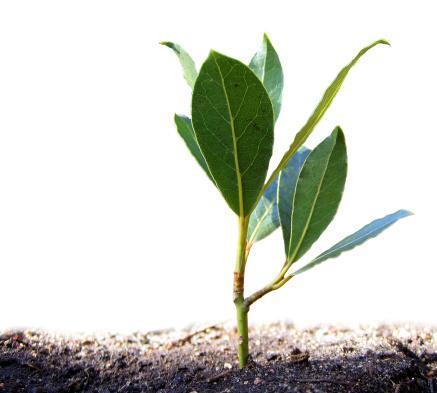
Innovation Strategy
Global Forum on Biotechnology
Committee for Scientific and Technological Policy (CSTP)
• Working Party on Biotechnology, Nanotechnology and Converging Technologies (BNCT)
• Working Party of National Experts on Science and Technology Indicators
Committee for Agriculture (COAG)
• Working Party on Agricultural Policies and Markets (APM)
• Co-operative Research Programme: Sustainable Agricultural and Food Systems
• Research Programme on Bioenergy (Trade and Agriculture Directorate, in collaboration with the International Energy Agency)
• Seed Certification Schemes (agriculture, forest)
Joint Working Party on Agriculture and the Environment (JWPAE)
Environment Policy Committee (EPOC)
• Working Party on Biodiversity, Water and Ecosystems (WPBWE)
• Working Party on Climate, Investment and Development (WPCID)
Chemicals and Biotechnology Committee (CBC)
• Working Party on the Harmonisation of Regulatory Oversight in Biotechnology (WP-HROB)
• Working Party for the Safety of Novel Foods and Feeds (WP-SNFF)
30









Biotechnology ICGB Newsletter No. 43
Internal Co-ordination Group for

























